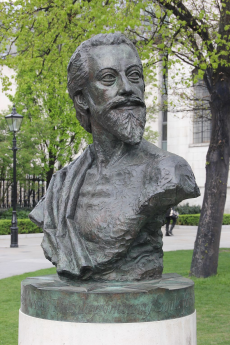
Death, be not proud, though some have called thee
Mighty and dreadful, for thou art not so;
For those whom thou think'st thou dost overthrow
Die not, poor Death, nor yet canst thou kill me.
From rest and sleep, which but thy pictures be,
Much pleasure; then from thee much more must flow,
And soonest our best men with thee do go,
Rest of their bones, and soul's delivery.
Thou art slave to fate, chance, kings, and desperate men,
And dost with poison, war, and sickness dwell,
And poppy or charms can make us sleep as well
And better than thy stroke; why swell'st thou then?
One short sleep past, we wake eternally
And death shall be no more; Death, thou shalt die.
John Donne (1572-1631) is perhaps the most widely known of the metaphysical poets, a loosely associated group whose poems focused upon love and matters of the divine, the two themes often intertwined, and perhaps his most famous poem, due to its accessibility and razor sharp wit, is “Holy Sonnet X”, or “Death, be not proud”. From the very first word we know what the central theme of this poem is going to be: death. Donne personifies death so he can make a mockery of it, attacking its power and its ability to instil fear in the hearts of men, women and children, telling it to “be not proud, though some have called thee/ Mighty and dreadful, for thou art not so”. He intentionally takes a condescending tone; we can almost see the great poet looking down upon the shadowy figure of death as he says this.
Back in the seventeenth century when this piece was written, death had a much more visible presence in society that it does today. In England you were lucky to live to the age of forty, since disease was rife and there was very little physicians could do to help the sick – there were no real hospitals and modern medicine was still a long way away at this point. Houses in which the plague was present would have a mark on their doors and couples would often try to have as many babies as possible since many would not make it through to adulthood – though there was a fair chance the mother would die during childbirth.
This gives some context as to why Donne thinks it important to stand up to death, as well as why so many would have regarded it as mighty and dreadful – it was a virtually unstoppable force at the time and even today we can only delay its arrival. Being a Christian, he reminds death that ultimately it has no hold on people, “For those whom thou think'st thou dost overthrow/ Die not, poor Death”, because, in Christian theology, the sacrifice of Jesus on the cross meant that humans could become part of God’s eternal kingdom, making death merely a doorway into a greater existence and not the end.
He also belittles the figure of death, saying that it is merely a “slave to fate, chance, kings, and desperate men”. Death may be powerful, but it has little agency in who dies, since that is decided upon by other forces – including mortal man. And in the closing couplet, he returns to the idea that the power of death is ultimately an illusion, since “One short sleep past, we wake eternally”. Through the saving grace of Christ, we will be able to conquer death and be made immortal – our bodies will never again wither and die, and so Donne triumphantly concludes, “Death, thou shalt die.”
Image: By Matthew Black from London, UK (IMG_9025) [CC BY-SA 2.0 (http://creativecommons.org/licenses/by-sa/2.0)], via Wikimedia Commons

0 Comment:
Be the first one to comment on this article.